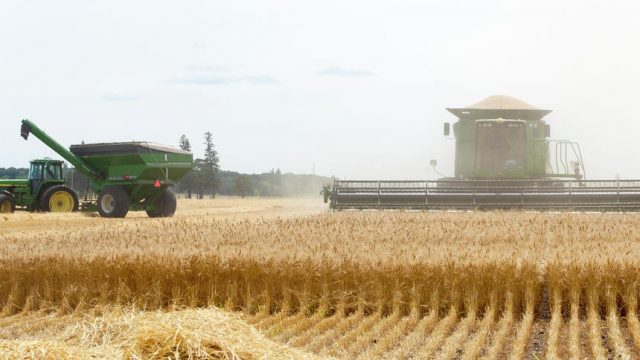North Dakota’s Corporate Farming Ban Is So Dumb We Have to Pass a Law So You Can Farm With Your Second Cousin

Farmer and Kittson County District 2 Commissioner Theresia Gillie (right) harvests wheat at her rural Hallock, Minn. farm on Thursday, August 2, 2018. Nick Nelson / Agweek
Let’s say your great-grandfather immigrated to North Dakota and started a farm.
It was a successful operation and, upon his death, he left it to your grandfather and his brother.
The brothers kept the operation successful and left it to their sons, your father and his cousin.
They, too, find success and they want to keep the family tradition alive and leave the farm to their sons. Only their sons are second cousins, and under North Dakota law that’s not allowed.
A business incorporated in North Dakota to farm or ranch must consist of no more than 15 shareholders all of whom must be related in a fashion in this list: “parent, son, daughter, stepson, stepdaughter, grandparent, grandson, granddaughter, brother, sister, uncle, aunt, nephew, niece, great-grandparent, great-grandchild, first cousin, or the spouse of a person so related.”
The second cousins are out of luck.
Which is absurd. If we were talking about any other business – from an accounting firm to an auto repair shop – this wouldn’t be an issue. But because it’s farming, there’s a problem.
State Rep. Aaron McWilliams, a Republican from Hillsboro, has introduced legislation to fix this problem for second cousins. It’s HB1388, which you can read below, but all it does is add “second cousin” to the list above.
Which is nice and all. Certainly a step in the right direction. But why in the hell are we doing this to the agriculture industry?
“To protect family farms” is the refrain you’ll get from the proponents of the status quo.
That was the message of the Farmer’s Union when, a few years back, they spent over a million dollars to stop a change to the corporate farming law which would have carved out an exemption for the states dairy and swine operators.
It worked.
That measure was defeated with some 75 percent of voters casting ballots against it, though it should be noted that Farmer’s Union was campaigning against a vacuum. The lawmakers who passed the law did little to defend it after Farmer’s Union paid signature collectors to refer the issue to the ballot.
But is the corporate farming ban protecting the proverbial family farm?
North Dakota is the only state left in the nation with this sort of a ban in place. Ag Week publisher Katie Pinke compiled some stats on farming in North Dakota and compared it to other states.
What she found is that, despite North Dakota’s law, things aren’t much different here:
North Dakota has 29,000 farms, 984,000 beef cows, 147,000 pigs, 70,000 sheep and 15,500 dairy cows. The average farm is 1,308 acres.
South Dakota has 31,000 farms with 1.8 million beef cows, 1.5 million pigs, 4.1 million turkeys, 260,000 sheep, and 119,000 dairy cows. The average farm is 1,397 acres.
Minnesota has 73,200 farms that average 354 acres. The state includes nearly 60 million chickens, 42 million turkeys, 8.5 million pigs, 455,000 dairy cows, 365,000 beef cows, and even 25,000 meat goats and 14,000 dairy goats.
Iowa has nearly 87,000 farms operating an average 351 acres. The state is home to 970,000 beef cows, 220,000 dairy cows, 22.8 million pigs, and 12 million turkeys. Iowa’s farming law is far less restrictive than North Dakota’s in terms of who can be a part of a family farming corporation. It also requires 60 percent of a farming corporation’s income to come from farming.
Can someone explain to me what the corporate farming ban is doing to help farming in North Dakota?
Because despite the chest-thumping from groups like the Farmer’s Union, who seem to be eternally lost in the days of the Nonpartisan League and farmer-backed populism, I’m not seeing it.
But hey, if Rep. McWilliams and his fellow lawmakers can overcome what is sure to be a concerted lobbying effort from the Farmer’s Union to pass their bill, at least second cousins can farm or ranch together.
[scribd id=398486452 key=key-BbwzKFMYdlYh8UD3KdBj mode=scroll




